|
Maidstone Road
Matfield Green
01892 725458
https://www.thestarmatfield.com/
https://whatpub.com/star-inn
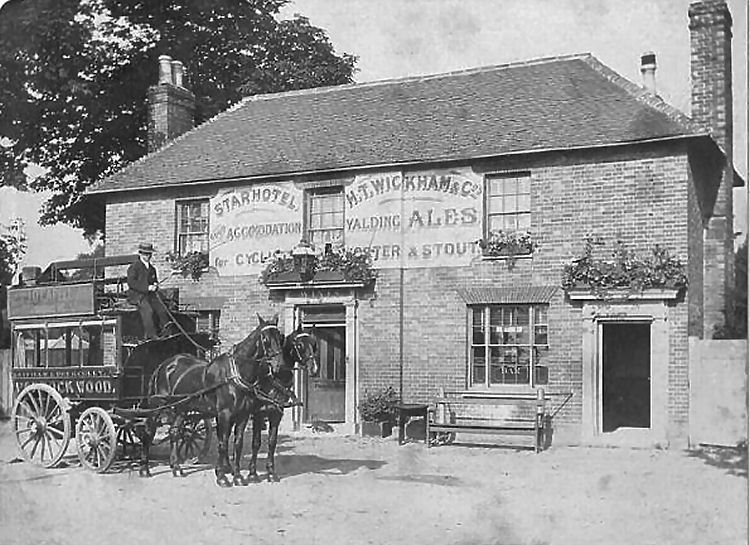
Above photo, date unknown showing the horse-drawn bus from Tonbridge. |
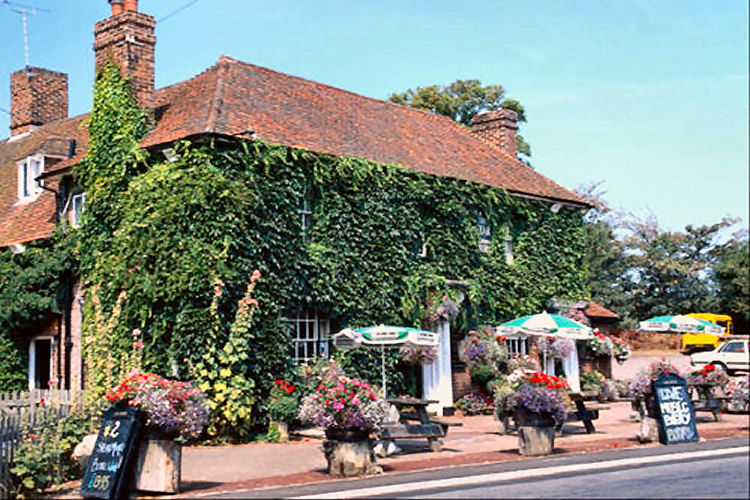
Above postcard, date unknown, kindly sent by Mark Jennings. |
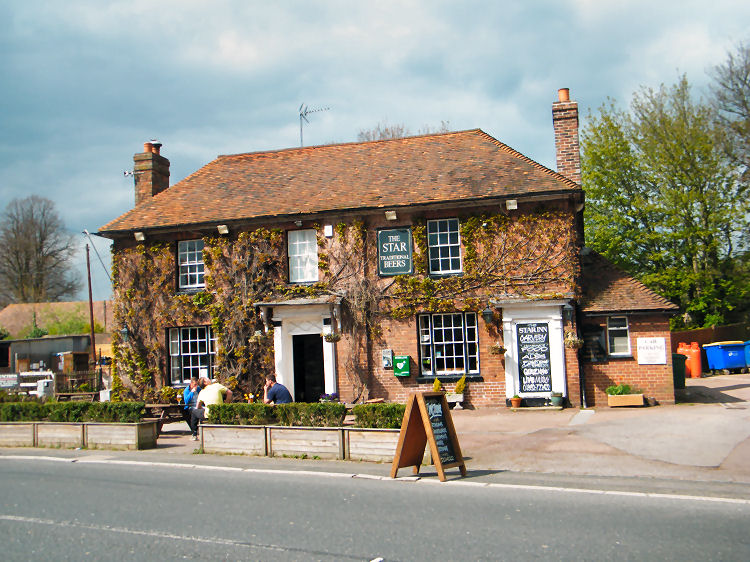
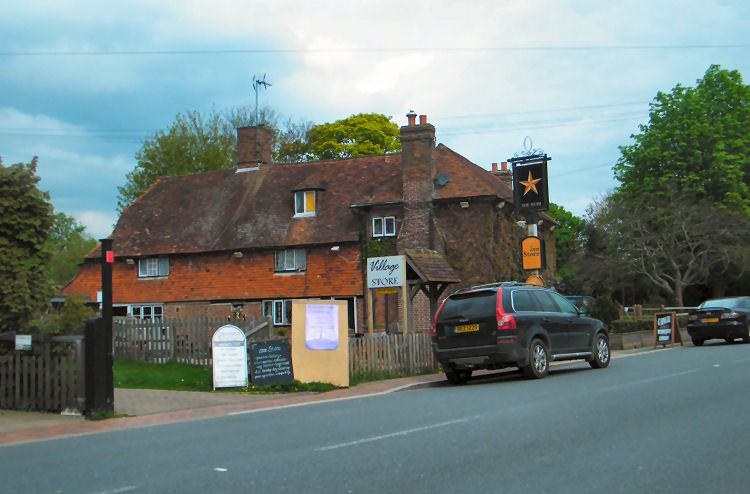
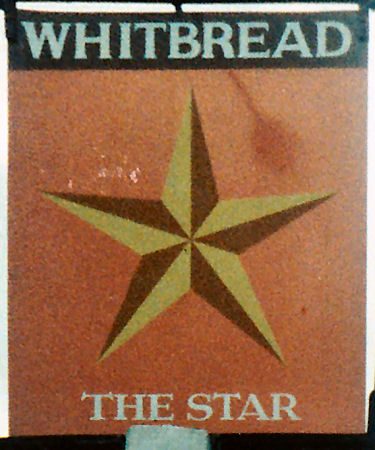 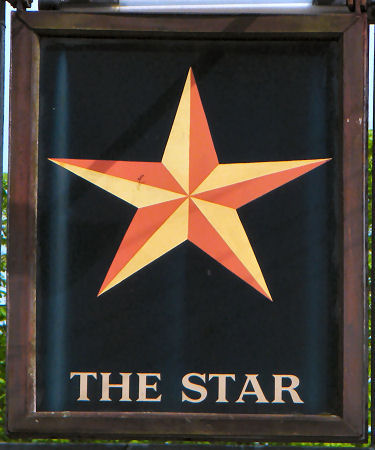
Above photos by Paul Skelton, 11 April 2014.
Sign left, May 1985.
With thanks from Brian Curtis
www.innsignsociety.com. |
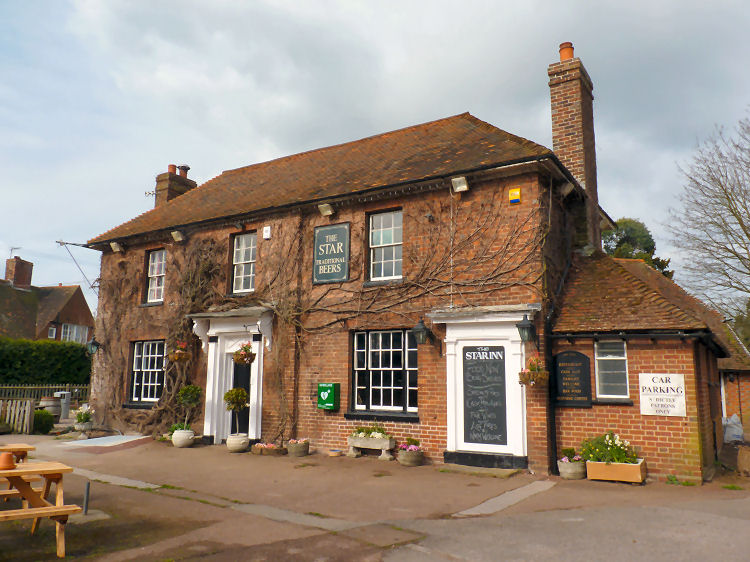
Above photo kindle sent by Tricia Francis, 5 April 2015. |
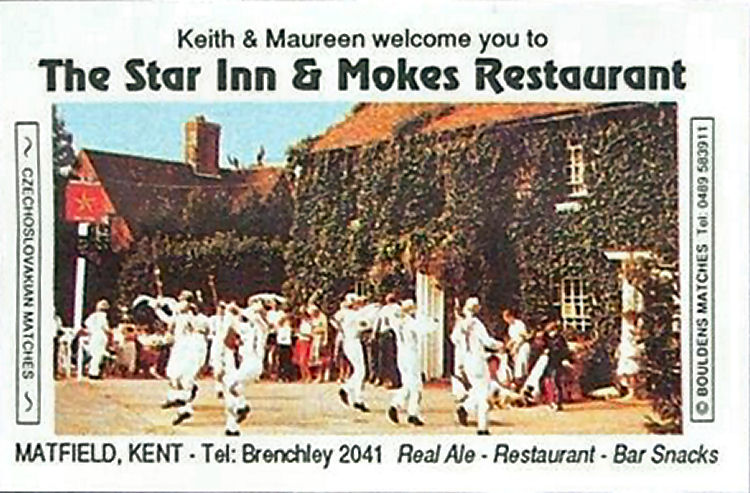
Above matchbox, circa 1980s, kindly sent by Debi Birkin. |
Project 2014 has been started to try and identify all the pubs that are
and have ever been open in Kent. I have just added this pub to that list but
your help is definitely needed regarding it's history.
As the information is found or sent to me, including photographs, it will
be shown here.
Thanks for your co-operation.
|
Maidstone Journal, 23 August, 1842.
Brenchley.
On Tuesday last, as Mr. Wenham, landlord of the "Star Inn," Matfield
Green, was passing through Parrock
wood, in this parish, he was attacked by a swarm of wasps. Mr. W. in
endeavouring to defend himself took
off his hat to beat them off; but the swarm increasing, he was
completely surrounded by hundreds of them
and most dreadfully stung about the head and face. Fortunately he
was near a house into which he fled for
protection, and, with the kind assistance of the good woman, he got
relieved of his tormentors. Mr. W. had
received so much injury that it was with difficulty he reached home,
and still severely suffers from the
effects of this alarming encounter.
|
|
Southeastern Gazette, 22 February 1853.
Death.
Feb 11. after a protracted illness, borne with exemplary fortitude,
Elizabeth, wife of Joseph Wenman, of the "Star Inn," Matfield-green,
Brenchley, and formerly of the "Star Inn," Heathfield,
(East Sussex) age 55.
|
|
Southeastern Gazette, 22 February 1853.
BRENCHLEY.
On Monday an inquest was held at the "Star Inn," Matfield-green,
before W. T. Neve, Esq., deputy coroner, to enquire as to the death
of Mrs. Jane Dartnell.
Eliza, wife of Charles Hickmott, deposed:— Deceased was thirty-seven
years of age, and has been ill for a week or two. Last Tuesday
morning, at about five o’clock, I was sent for to see deceased; I
found her in bed, dangerously ill. She complained of violent pain in
her side. My husband went for Mr. Monckton, who being from home, I
sent for Mr. Whittle, who came a little after six o’clock. I
continued in attendance on her as nurse until Wednesday evening. Mr.
Whittle attended until Thursday morning, and sent her two bottles of
medicine, one of which only she took, saving she thought the linseed
tea I had made for her suited her best, and that she didn’t hold
with the doctor. I saw her again on Thursday morning, down stairs.
Her husband does not sleep at home, but at his mistress’s, an old
invalid lady, who lives about a mile distant. There was a little
girl in the house, fifteen years old, who attended deceased on
Wednesday night. I got her some breakfast on Thursday, and then left
her, as I was not engaged as a nurse. In about an hour the little
girl came in for me, and I went immediately. The deceased was then
up stairs on the bed, partly undressed. She said "I was in pain, and
I took some of these Morrison’s pills," and added "I ought not to
have done so." She seemed much worse and laboured for breath very
much; she also, said "I’ve been drinking a little gin." Mr. Whittle
came in about twelve o’clock. By his desire I sent the little girl
for deceased’s husband; this was about twelve o’clock, but her
husband did not return I home until eight. I didn’t see deceased
again until Friday morning, at a quarter to four; she died at
half-past eight.
Ann Norman, aged 14, deposed:— I have been nurse-maid to the
deceased nearly two years. The deceased was first taken ill last
Thursday week. Mr. Whittle first attended her and afterwards Mr.
Monckton. At about halfpast twelve in the night of Wednesday last
she desired me to get her a box of Morrison’s pills from the table
drawer. She took twelve of the pills then, and an hour or two
afterwards took fifteen more. She seemed in a good deal of pain
afterwards in her side. She had been accustomed to taka these pills
four or five at a time. I went for her husband on the Thursday at
noon; he was having his dinner, but ha said he would come as soon as
he could; he did not come until eight o’clock, although I told him
how ill his wife was. Mrs. Lambert was with her all the afternoon. I
counted the pills for her into a spoon; twelve the first time and
fifteen afterwards. She said she took them because she was in pain,
and that she thought they would do her good. She took the pills in
jelly out of the spoon.
Sarah, wife of Alexander Lambert, deposed:— I live near the
deceased. Last Thursday afternoon I went in to nurse her, and
remained with her all that night. She told me she had taken tweuty-seven
of Morrison’s pills, and was sorry she had taken them, that she did
not generally take more than four at a time; that if her head had
been right she should not have taken so many. She died on Friday
morning, a little before eight. She was insensible all Thursday
night. She told me on Thursday that she had taken about half a pint
of gin in the morning. I saw her about twelve on Thursday; she had
been relaxed all the morning, but that ceased altogether at about
four or five in the afternoon. I observed that she was almost lost
all Thursday; that she didn’t seem to know what she was about. Mr.
Whittle told me she had inflammation of the lungs.
Mr. Stephen Monckton, surgeon, deposed:— I first saw the deceased on
Thursday, the 8th inst., at about three in the afternoon; she was
then labouring under severe inflammation of the right lung; and was
besides under great mental excitement bordering on acute mania. Her
life was then in considerable danger. I didn’t prescribe anything
for her, finding that Mr. Whittle was in attendance. I heard nothing
of the case until Thursday, when I saw her in the evening, and found
that she had taken the pills and gin, as detailed by the other
witnesses. In my opinion inflammation of the lungs was the cause of
her death, but it became so to a great extent from the aggravation
arising from the combined influence of the pills, gin, and exposure.
The jury, having consulted some time, returned the verdict that,
deceased died of inflammation of the lungs, aggravated by a large
dose of Morrison’s pills and a quantity of gin indiscreetly taken by
herself.
(Morrison's Pills worked by clearing out
the system like a laxative)
|
|
Kentish Gazette, 22 February 1853.
Brenchley.
DEATH FROM TAKING MORRISON'S PILLS.
An inquest was held at the "Star Inn," Matfield Green, on Monday
last, before T. Neve. Esq., and a respectable jury, of which Mr. A.
G. Diamond was foreman, to inquire into the cause of the death of
Jane Dartnell, aged 37, wife of Wm. Durtnell, a labouring man,
residing at Matfield, grocer.
Mrs. Hickmott deposed that she lived in the adjoining cottage to the
deceased; site was called into the deceased by a little girl named
Norman, on the morning of Tuesday, the 8th; she found her extremely
ill, and recommended medical attendance. Mr. Whittle, surgeon, of
Brenchley, attended, and administered some medicine, part of which
deceased took, and refused the remainder; she continued to get worse
until Friday morning, when she died. Witness had understood the
deceased had taken two large doses of Morrison's pills.
Ann Norman, aged 13, deposed that she had lived with deceased for
some time past. During the last week deceased bad been very ill; Mr.
Whittle had attended her but she refused to take the medicine sent
by him; she had been in the habit of taking Morrison's pills. On the
night of Wednesday she desired witness to give her a box of
Morrison's pills that she had in the house; she took 15 of them at
once, and in a short time afterwards she took 12 more; on Thursday
she was much worse and died on Friday morning. Deceased had also
taken a considerable quantity of gin from a cupboard in her room.
Sarah Lambert, a neighbour, deposed that he was called in to the
deceased on Thursday; she found her in what she thought to be a
dying state. She was informed of the quantity of pills she had
taken, and immediately sent for Dr. Stephen Monckton, who, on
arriving, pronounced her case to be hopeless.
Stephen Monckton, M.D., deposed:— On being called to the deceased on
Thursday, I found her to be labouring under a severe attack of
inflammation of the lungs. I was informed of the quantity of pills
and gin she had taken, which I knew would have the most baneful
effects on her; I prescribed what I thought to be necessary; on
Friday morning I heard she was dead.
The jury, after consulting a considerable time, returned the
following verdict:— "The deceased died from inflammation of the
lungs, death being accelerated by taking a large quantity of
Morrison's pills and gin, she being unconscious at the time of what
she was doing."
|
|
Maidstone Journal and Kentish Advertiser, Monday 21 October 1867.
Housebreaking at Brenchley.
William Thomsett, was indicted for breaking into the house of
William Collins, of Brenchley, on the 8th of October, and stealing
some cake and cheese there from.
Mr. Biron prosecuted, and Mr. Barrow defended.
William Collins, labourer, living at Matfield Green, said he was
uncle to the prisoner. On the 8th of October he went home to dinner,
and left at ten minutes past one to go back to work. When he left
everything was safe in the house. Before going out to he picked up a
needle and put it on the window sill. He returned to the house soon
after 6, having heard that someone has broken into his house. He met
P.C. Marsh, and they examined the premises, and on the window sill
they noticed a fresh mark. Soon afterwards the prisoner was taken to
the prosecutor's house, and a knife taken from him, which he
admitted was his. The knife was fitted to the mark on the sill, and
found to correspond with it. Outside the window they noticed some
footmarks. There were ten panes of the window glass broken, having a
space sufficient for a man to get through. Prisoner was asked to
compare his footmarks with those by the window, but he said he did
not care about it. The policeman then took one of his boots and
compared it with the the mark and it was found to correspond. His
wife found the button inside the room, near the window. Marsh asked
prisoner if he had got a button off his clothes, but he said he did
not think he had. Marsh then examined his clothes and found one of
his buttons missing. The button was similar to others on prisoners
clothes. Prisoner said to witness, "Collins, I hope you won't
transport me."
Cross-examined:- Prisoner was at my house on the Sunday previous to
my house being broken into.
Mary Collins, wife of the former witness, on returning home on the
evening question, found a box had been broken into and the contents
turned over. There was some cake and cheese taken off the table. She
corroborated her husband's statement as to finding the button and
hearing prisoner ask him not to transport him. The cake would
produce crumbs like those produced.
P.C. Marsh, stationed at Brenchley, said he went on the 8th of
October to Collins' Cottage, and found ten panes of glass broken,
and an aperture sufficient for a man to get through. He observed the
mark on the window sill, and took the knife produced from prisoner.
He saw prisoner at his own house about 8 o'clock, and told him
prosecutor's house had been broken into, and he wanted to see what
he had in his pockets, because some cake and cheese had been stolen.
He said, "How did you know it was me?" Witness asked him if he had
been wearing the same boots all day as he then had on. He took him
to the Collins' house, and compared the knife with a mark on the
window sill. Prisoner said he did not care about seeing his boots
compared with the footmarks, but the constable took his boots off
and compared them with the marks, and found them to correspond
exactly. There were several peculiarities about the boots, which was
similar to the marks. Witness asked prisoner if he had lost any of
his buttons, and he said he did not know he had. The button found in
the room was compared with those on prisoners trousers, and it was
found that one was missing.
Cross-examined:- I served the summons on three of the prisoner's
witnesses, and amongst them one on Larking. I did not ask him any
questions of the evidence he was going to give. I asked him if he
was with the prisoner on the day in question. I did not say anything
to him about penitentiaries. I afterwards saw Larking in company with P.C.
Tucker. I did not hear Tucker say anything to the boy about
penitentiaries or reformatories.
Mr. Barrow put several questions to the witness concerning the
instructions received by the police to prosecute their enquiries in
criminal cases, and the interest they had for the conviction of
prisoners, which were objected to by Mr. Byron, and it was decided
that the point should be reserved for judicial opinion to be taken
in case of a conviction.
Sergeant Mayne, stationed at Hadlow, corroborated the last witness
is evidence as to the footmarks.
James Boulden said he saw the prisoner pass the plantation where he
was at work between 4 and 5 in the afternoon, going towards the
prosecutors house.
Cross-examined:- That was after I heard that the house had being
broken into. When I saw prisoner he was coming from the direction of
Gage's Farm.
Thomas W. Sharpe, living with his father, a grocer, at Matfield
Green, said he saw prisoner between 1:30 and 2:30, going in the
direction of the road leading to Collins' house.
Cross-examine:- If a person were going from the "Star Inn" to
Chandlers' house, he would have been going in the direction that I
saw him. There might have been another person in his company that I
did not see.
This being the case for the prosecution, Mr. Byron briefly summed
up.
Mr. Barrow addressed the jury for the defence at some length, and
stated that he would be enabled to prove an alibi.
He called Henry Goad, who said that on the 8th of October he met the
prisoner at the "Star Inn," Matfield, about 11 o'clock, and they
remained together until 1:30, when prisoner left in company with
Larking. They went in the direction of Chantler's house.
Cross-examined:- Prisoner was not out of my sight until 1:30, when
he left with Larking.
Samuel Larking said he lived with his father at Gage's Farm,
Brenchley. On the morning of 8th October he was at the "Star Inn."
Prisoner joined him in the taproom. He lost sight of him for
sometime, but he ultimately joined him again. Between 1 and 2
o'clock they left the "Star Inn" together, and went to Chantler's
house. The road to Chantler's would take them past Sharp's shop.
Witness and prisoner remained there sometime, and then went to
Kemp's Beerhouse. On leaving there they went by Gage's farm, and
prisoner then left him. That was all about 4:40. Prison was not out
of his company more than 2 or 3 minutes from the time they left
"Star Inn" until nearly 5 o'clock.
Elizabeth Chantler remember prisoner and Larking going to her house
to see her husband about 1:30 on the day that Collins's house was
broken into. When they left they went in the direction of Kemp's
beer shop. Prisoners mother and witness made cakes that would
produce crumbs like those produced.
By the Chairman:- I am certain prisoner and Larking could not have
come from the five wents when they came to my house.
Mrs. Kemp said her husband kept the beer shop. Prisoner and Larking
went to her house between 3 and 4 o'clock in the afternoon on the
8th inst.
The learned Counsel on both sides having replied on the evidence,
the Chairman carefully summed up the case to the jury.
The jury after a short deliberation acquitted the prisoner. This
case occupied the court 4 hours. |
LICENSEE LIST
HARTRIDGE Richard 1828+

BOWLES Thomas 1832-34+

WENHAM Joseph 1842-62+ (widower age 65 in 1861 ) )
WENHAM Joseph 1871+ (also butcher age 39 in 1871 ) )
DUNK David 1874+ (also butcher)
SMITH John 1881+ (age 56 in 1881 ) )
PARKES James P 1891+ (also butcher age 38 in 1891 ) )
JEFFERY Thomas 1901-11+ (age 55 in 1911 ) )

HOARE Arthur John 1913+
HALL Arthur John 1918+
Peoples Refreshment House Association Ltd 1938+
???? Keith & Maureen 1980s?
https://pubwiki.co.uk/Star.shtml
https://pubwiki.co.uk/Star1.shtml
 From the Pigot's Directory 1828-29 From the Pigot's Directory 1828-29
 From
the Pigot's Directory 1832-33-34 From
the Pigot's Directory 1832-33-34
 From the Kelly's Directory 1903 From the Kelly's Directory 1903
 Census Census
|







